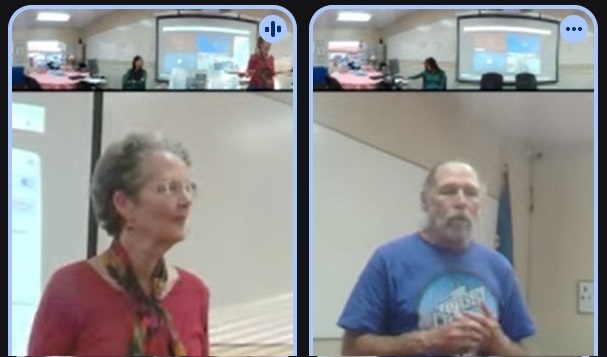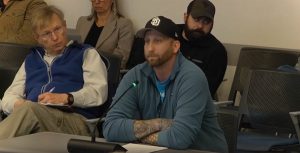With city budgets shrinking, neighborhoods move online
8 min read
Presenter: With cuts ahead to the neighborhood mailing budget, one neighborhood association is showing how to mix direct mail with email.
The Neighborhood Leaders Council hosted an introduction to neighborhood news publishing June 24 from the national-award-winning Jefferson Westside Neighbors and Ted Coopman:
Ted Coopman (JWN): So, an electronic newsletter is mostly for your core constituency and not for the neighborhood as a whole, because you just can’t get the number of people. You know, we send out over 4,000 mailed newsletters, 4,000 addresses in the neighborhood—we have about 750 people on our e-news list, right?
[00:00:39] So if you think of it as something that’s a little bit more narrowcasting versus broadcasting to kind of build up your base, and then, of course, trying to pull as many people as you can onto that list in order to maximize your outreach.
[00:01:10] So what we did is that we originally started out with the e-news that came out once a month. And then we had so much content that we had to split it into two e-newsletters. So the first one is events, which is things that are happening, specific events that are going on in the neighborhood and a few ancillary things as well.
[00:01:22] And then after we have our meetings, which is the second Tuesday, we have our regular e-news, what happened at the meeting, and that’s more content, volunteer recruitment and things like that. So that has been our approach.
[00:01:36] I live with an editor. And so I do it and then I give it to her and when she goes through it. (I recommend two steps, two stages for that.)
[00:01:45] But the main thing is to collect, have a system to collect your information going forward. So have an email address, whether it’s a general email address for neighborhood association or something that’s dedicated to it. And you want to have someone (who’s maybe on the board or even not on the board) handle it, and just create an email address for your newsletter and subscribe to everything. So that makes sure everything is just, unzipped to you, and then you filter it as you go on a regular basis.
[00:02:17] Otherwise, if you don’t, it just becomes like a massive job that you have to work through. So what I do is usually every day, I’ll check, or at least every other day. Check the email address and I’ll go through and I’ll pull things out and I’ll throw them into a folder.
[00:02:37] And then I use that folder to go ahead and to build the e-news moving forward, usually over a couple of days. Just like any type of writing, you want to do something that’s more iterative. So you work on it and step back a little bit and then go back to it in order to kind of figure figure it out.
[00:02:55] And so we have regular monthly features which are, like, right now: Meals on Wheels, volunteers, that’s in every month. We have rolling emergency preparedness, we do EWEB’s Pledge to Prepare and so every month we have that pledge of preparedness in there and use that as a way to kind of interact between it and our own disaster preparedness committee.
[00:03:20] And so we kind of expanded that a little bit because we’ve gotten a lot of traction on that committee. So we’re working on other simple things, ways to bring people in. It’s like, you know, bolt your bookcases to the wall or whatever you’re going to do, but, you know, buy some water, really easy things to do, right?
[00:03:39] And then to recruit for the committees, publicize our needs, we use MailChimp. It’s about $27 a month, which the city will pay it. And so it’s not that expensive.
[00:03:55] They have live chat help to do it. The best way to ramp up is to look at other, go around, and I think this we did this before quite a while ago on the NLC list. Just be like, ‘Everybody: Post links to your newsletters’ and you go in. All of our past newsletters are on our website.
[00:04:15] You can click on them and you can see how it’s laid out. There’s no reason to invent the wheel. It’s just something you should just go ahead and just do. It really doesn’t take any really fantastic skills.
[00:04:29] Being able to write is definitely useful, but something like that, e-news is a very short form. So someone wants to contribute something and usually 200 words max because you have to look the way it lays out on up. Most people use their phones or something like that.
[00:04:45] Generally speaking, we’ve got a pretty good pipeline on and as far as different people who submit materials to the e-news. We don’t get a lot of people who submit. Sometimes they’ll read something and they’ll be like ‘Oh,’ and they want to go ahead and chime in on it or to promote whatever they’re doing a little bit more extensively than maybe we would.
[00:05:08] But you generally get news releases. Like party plans: You know they always send out a big news release and the library will send you out a news release every month with like graphics and stuff like that. We always have a regular library feature, what’s going on there. We have always, Oregon State Extension is in the neighborhood so we do them.
[00:05:31] We try to be very specific because there’s just too much information and we’re very specifically focused on things and you always have to ask: ‘Is this directly relevant to people in the neighborhood? Something that they can use, especially land use stuff traffic like construction and it kind of informing people on that.
And then, you know, fun stuff. They unearthed a bunch of trolley tracks, we took some pictures of that. Tips on yard things or your dog or other interesting stuff that you can just kind of pull in.
[00:06:05] It’s just a matter of kind of being aware and alert and you’re grabbing stuff over the course of the month and then putting it together. And just to not stress out about doing it. You just have to try to let go and just let it iterate over time and it will get better and it’s just something that’s going to take a while for you to develop.
[00:06:28] It’s really, it’s kind of breaking through the barrier of it, right? Because it’s the first time you have to facilitate a meeting, and you’re just kind of like, ‘Argh, I’m stressed out! I’m just going to do it, and I’m going to let the chips fall when they may, and it’s just going to happen.’
[00:06:45] I mean, I had a lot of experience coming into it from my job, because I’m a retired college professor, and I ran students, social media, newsletter, a bunch of other stuff like that. So I somewhat knew what I was doing, but you definitely develop things over time, refresh things over time.
[00:07:03] It helps if you can get your hands on a graphics person in the neighborhood. We’re very, very fortunate that we have a graphics guy who just like knocks stuff out for us. Very fortunate in that regard. And that ultimately is the problem of doing it neighborhood by neighborhood is that those resources are not spread evenly.
[00:07:23] We do three printed newsletters a year, which is: We do one in the fall and then one in the winter. We have our elections in April, so that kind of tease out ‘Do you want to be on the board?’ and that runs in our eight-page newsletters, and then we do a short four-page newsletter in June to promote our picnic, and that’s a little bit more, lighter, it’s mostly pictures and, keyed on volunteering for stuff.
[00:07:52] For our neighborhood, that eight-page newsletter, printing and mailing with all volunteer labor is about $3,700 now, which is about $1,000 more than it was when we started. So it is expensive, but it’s the only, I mean, direct mail is the only way to do it.
[00:08:10] Presenter: Jefferson Westside will soon be offering advertising in its neighborhood newsletters. Ted Coopman:
[00:08:16] Ted Coopman (JWN): Moving forward for our next newsletter, we’re going to do underwriting for businesses. Now the thing is, you do not have to necessarily just go with businesses in your neighborhood. There’s no limitations to that.
[00:08:30] And so we’re going to experiment with doing, I think we’re going to do two pages of ads, quarter-page ads, and start off with, we’re thinking maybe 200 bucks.
[00:08:44] And I’ve talked to a couple of the businesses because we promote businesses all the time. They’ve gotten tons of free advertising from us. We do business profiles, we’ll do neighbor profiles and stuff like that. And the ones I’ve talked to, they’re like, ‘To hit everybody in the entire neighborhood for 200 bucks?’ And that’s something you can build on.
[00:09:03] And I think that for us as a group, what we need to do is to really work on best practices, and that comes with fundraising or anything else. Because if we can make this work, then I could be like, ‘Okay, this is how we did it. This is what did not work,’ right? Ultimately, you’ve got to get out and do sales calls.
[00:09:23] Presenter: From Friendly Area Neighbors, Tom Peck:
[00:09:26] Tom Peck (Friendly Area Neighbors): What do you charge for $200?
[00:09:30] Ted Coopman (JWN): Quarter page. For a quarter page (Quarter page?) Yeah, the page was 8-1/2 by 11 (inches), that was just what we’re going to start with. We didn’t want to get into—because I don’t know if you ever tried to place ads like in the Weekly or whatever. It’s very nightmarish and that was just a little bit too complex that way it’s just that’s the size, you provide the graphics and we’ll just, you know, we’ll just drop it in.
[00:09:54] So also because we’ve got editors, an editor that spends a tremendous amount of time on that newsletter, plus a graphics person coming in on the backside for an assist on different things, plus people writing content.
[00:10:08] Lots of pictures, right? Lots of fun graphics. You want to hit people to be like, ‘Oh, I’m going to open this up.’ And then it’s like, “Oh, I mean, you know, hit the QR code on it.’ Or, ‘Visit the website.’ You promote the e-news in your mail newsletter as well with the idea of trying to build up that subscription base.
[00:10:27] Presenter: With the revitalization of the Neighborhood Leaders Council, neighborhood associations are adapting to a smaller city budget by innovating—and winning national awards while doing so.






